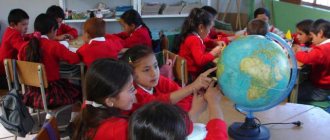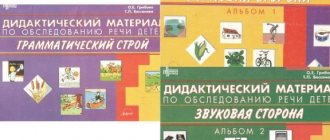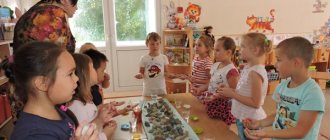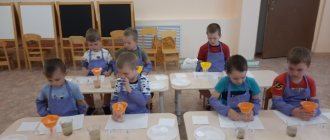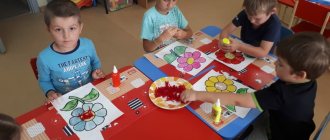Ways to involve children in different activities
Educators often face a problem when a child refuses any type of activity (art, music, joint play, etc.). For example, he does not want to do something together with others, preferring to play alone with his favorite toy. In such situations, various variations in the behavior of an adult are possible.
For example, a teacher insists that a child stop playing with a toy and switch to another activity, doing the same thing as other children. At the same time, the adult seems to have good intentions and wants the child to acquire new knowledge, skills and abilities. However, by insisting on his demand, he suppresses the child’s initiative. Activities in which a child participates at the direction of an adult often turn out to be uninteresting for him - he participates in it only formally. This leads to a person’s passive position, which can be expressed as follows: “An adult always knows better what to do.
Let's consider another option. The teacher always allows the child to do what he likes best and never encourages him to participate in other activities. At first glance, this attitude looks like a manifestation of an individual approach to education. However, a truly individual approach requires creating conditions that allow each person to develop most effectively. A situation where a teacher “leave” a child alone can be used as a temporary measure. The effectiveness of an individual approach to raising a child can be analyzed using the following example.
Every day Olga plays with only one toy - a teddy bear. So, she reproduces the same action (rolling him in a trolley), does not want to be busy with something else, and avoids communicating with peers. In this case, the teacher should try to expand the child’s range of interests, encourage him to engage in new activities, and play with other children.
For example, an adult can invite Olya to build a house for a bear cub, make clay pies, or draw a picture. To involve a girl in playing together with her peers, you can offer to organize a birthday party for the bear cub and invite children. At the "party" they will dance, sing, play outdoor games, etc.
Thus, using gaming techniques, the teacher can involve the child in various types of activities, during which he will learn elementary methods of forming, drawing, constructing, and gain experience communicating with peers. Discussion as a means of resolving conflict situations. The need to correct the actions and behavior of children often arises in various conflict situations, when just a remark is not enough, but its solution should not lead to a new conflict; Children should not forcibly distance themselves from each other, accompanying their actions with reprimands and threats. Violence and aggression beget mutual violence and aggression. An effective way in this case is to discuss with children the problem that may arise either between children or between a child and an adult. The adult helps identify the problem, suggest the best solution, evaluate the result and praise the children for a successful solution.
Implementation of a person-centered approach in the practice of education
Personally-oriented pedagogy means for a teacher not only the creation of a favorable atmosphere, but also a constant appeal to the subjective experience of the student as the experience of his own life activity. The main goal of person-centered education is to reveal the content of each child’s subjective experience, bring it into line with the current tasks of educational work, and on this basis initiate the process of self-education of the child.
How is this approach implemented in the specific conditions of the pedagogical process? The teacher pays special attention to the integration of each student's unique and inimitable subjective experience with real-life activities. The correlation of socially significant and personally significant individual experience occurs in the interaction of the teacher and the child on the basis of balanced initiatives of the adult and the child as equal partners.
The implementation of person-centered education requires the teacher to comply with the following requirements:
- use a variety of methods, techniques, forms, ways of revealing the subjective experience of students, identifying their character traits, tastes, and views;
- rely as much as possible on independent activity, that is, not so much to direct as to organize and direct the activities of children
- involve children in independent or joint setting of educational goals, planning activities
- Encourage children to independently choose and practice socially acceptable behaviors.
- create situations of pedagogical communication in which each student can show initiative, independence and selective behavior
- Provide opportunities for students to express themselves naturally;
- encourage students to express themselves, analyze the motives and methods of their own behavior and the behavior of other students, and make value judgments at the appropriate age level;
- strive to encourage and evaluate not only actions, but also needs, motives, methods of activity, direction of activity and degree of independence.
- involve each child in a discussion of the goals and results of learning, successful steps, reasons for successes and failures, attitude towards the activity (what you wanted to repeat and what you wanted to do differently).
Understanding a child means penetrating into his inner spiritual world. Understanding is based on diagnosing the child’s personality and studying his experience and consists in the fact that the teacher creates on this basis a holistic picture of the child’s personality. Recognition of a child means the child’s right to be himself, the child’s right to respect from an adult. Recognition of a child means that the teacher maintains a balance between the child’s freedom of action, thinking and goal-setting and the reasonable demands placed on him by the teacher and society.
Acceptance of a child is a positive attitude towards him without any conditions on the part of parents and teachers. Accepting a child does not mean abandoning educational requirements, but presupposes such an attitude towards educational tasks and the choice of educational technology that best ensures the development of this particular child.
Academy for your education
Features of the implementation of a person-centered approach in a preschool educational institution
Abstract: This article analyzes the theoretical foundations of the formation of new values in preschool children and the development of individual characteristics in accordance with the requirements of the new programs of the Federal State Educational Standard for Preschool Education. These points have become the basic component of a student-centered approach in education. The features of the organization of the developmental environment in a children's educational institution in the context of the implementation of person-centered education are also considered.
Key words: Personality-oriented approach, program implementation, preschool age, individuality, developmental environment.
PECULIARITIES OF IMPLEMENTATION OF A PERSONAL-ORIENTED APPROACH IN A PRESCHOOL EDUCATIONAL INSTITUTION
Abstract: This article analyzes the theoretical foundations of the formation of pre-school children of new values and the development of individual characteristics in accordance with the requirements of the new programs of the Federal State Educational Standard of Pre-school Education. These items have become the basic component of the student-centered approach to education. It also discusses the features of the organization of the developing environment in the children's educational institution in the context of the implementation of personality-oriented education.
Key words: Personality-oriented approach, program implementation, preschool age, individuality, developing environment.
Formulation of the problem. The education system is a continuously changing object; it is natural that with each subsequent year the demands for building the educational process change, as required by the realities in society. At today's turn, the personal characteristics of a particular individual are the defining moment for the formation of values of self-realization and self-development. These values, in turn, form the basis of the modern student-centered approach to education. Over time, the preschool education system itself changes the general vector of the direction of development, switching from the authoritarian approach previously accepted in Russian pedagogy to a personality-oriented model of constructing pedagogical interaction. A logical consequence of these changes was that the goals and objectives of the education system themselves changed, because the main focus was the development of the child’s intellectual, physical, spiritual abilities and motives that are characteristic of his particular individuality. In other words, this is the direct personal development of the child, the enrichment of his inherent abilities.
This understanding of the process of development of a child’s individual qualities is reflected in the Federal State Standard of Preschool Education. This regulatory document ratifies such principles of domestic preschool education as maintaining the exclusivity of the original features of this age, the humanistic foundations of interaction between an adult and a child, respect for the personality of the student on the part of all participants in the educational and upbringing processes, the implementation of the adopted development program in all areas characteristic of a particular age stage types [6].
Currently known works in the field of developmental psychology indicate that the basic personality traits are formed in the first seven years of life. Those elements of personality development that were not acquired by the child during this period, over time, are either not identified at all, or are acquired with great complications, and are recreated with a low level of reliability [5; With. 64]. Thus, we can indicate the significance of the study of this problem when planning the educational process in a preschool educational institution. The article proposes to analyze the issue of the theoretical foundations of the student-oriented approach in education, in order to reveal the features of the implementation and implementation in practice of this model in the pedagogical process.
Literature analysis. There is a large number of academic works and research in the field of the topic of the student’s personality as the basis for effective education and upbringing. Psychologists L. I. Bozhovich, L. S. Vygotsky, A. N. Leontiev, S. L. Rubinshtein wrote about this problem in scientific works), in the nuance of studying the patterns of personal development, and teachers (N. A. Alekseev , V.V. Serikov, E.N. Shiyanov), when analyzing the development of basic personality qualities during training [2].
Purpose of the article. The purpose of this article is a general analysis of the specifics of implementing a person-centered approach in preschool education, familiarization with the theory of the formation of unique values and specific characteristics in preschoolers, which have become the main element of this approach.
Presentation of the main material. It can be stated that over a long period of time associated with transformations in the field of education, technologies that are focused on the development of the child’s personality have noticeably strengthened their position, and, having received support from government authorities, they were recorded in the Federal State Educational Standard for Preschool Education . In accordance with the principles outlined in the standard, the preschool years become the most significant stage for the beginning of the successful formation of a full-fledged personality. Great importance is attached to recognizing the unique value of childhood, respect for the child’s personality and his distinctive features. At the center of the pedagogical process, from this point of view, is the personality with its unique combination of already formed and potential capabilities.
The Federal State Educational Standard for Preschool Education is based on a change in the vector of development of preschool education. It is associated, first of all, with the transformation of the perception of the role of the preschool period in the process of personality development. It can be noted that at the present stage, in terms of the implementation of the educational standard, the organization of work with children who have inherently different educational needs due to numerous conditions - the health status of the preschooler, innate qualities, temperament, family relationships and others - has become the leading one. The present strategy for restructuring the concept of preschool education resonates particularly closely with the model of a student-centered approach.
The key condition for improving and diversifying the activities of preschool educational institutions is the search for effective pedagogical technologies in order to implement this educational model. Technologies aimed at developing creativity, independence, and entrepreneurship at this stage are coming forward, as opposed to technologies of the authoritarian style of pedagogical influence and the educational and disciplinary model of education. Strengthening the position of a person-centered approach in the implementation of the Federal State Educational Standard for Educational Education is focused on maximum optimization of the methodological and organizational tools of a preschool institution. It, as a specific pedagogical technology, has the orientation of a universal technique, a tool, and in itself is also included in other pedagogical technologies. Thus, we can give examples of such technologies in working with preschool children as information and communication, health-saving, gaming, in the initial provisions of which there is always, to one degree or another, a reference to the theses of the person-oriented approach [3; p.113].
If we return to the idea of a directly person-oriented approach, it is worth establishing that, in general, this model in preschool education is not new, however, it takes on a more categorical meaning when applied as part of the implementation of an educational standard. In this case, it becomes the basis for improving the activities of first-level educational organizations.
The literature notes that the idea of a student-oriented model of education in domestic pedagogy was formed in the 90s of the twentieth century. But still, here we are talking about a direct introduction to education and recognition of the role of this model. Much earlier, by the end of the 19th century, pedagogical approaches were developed that reflected all sorts of variations of individually oriented models. N.A. Alekseev noted that it was in domestic pedagogy that the above-mentioned versions of educational approaches were personality-oriented in essence, because they were based on the independent definition of students in all spheres of life [2; c. 46].
Various experts in the field of pedagogy and psychology give their own interpretation of the concept of a person-centered approach. Therefore, despite the variety of works in this area, it is quite difficult to give a single definition. A number of examples can be given. Thus, T.I. Kulypina, under the definition of personality-oriented education, indicated, before other factors, the development of the personal inclinations of each child from the point of view of two sides: procedural and substantive. The procedural aspect of development is the disclosure of natural, internal properties of a person, the so-called universal ones. In turn, the content side reflects the formation of value orientations of the individual. She also described the student-centered approach in education as the highest type of activity. Thus, in her opinion, with the implementation of this model, the dominant role of knowledge is transferred to the importance of the development of all aspects and nuances of personality.
Another representative of domestic pedagogy, V.V. Serikov, reveals the meaning of the student-oriented approach as the construction of a special form of the pedagogical process, with all the distinctive goals, technologies, methods and features. This process is aimed at developing specifically the personal properties of each individual [5; c. 88].
Also, in order to compare different formulations, we can cite the definition of the Western educator K. Rogers, who became the founder of the personality-oriented approach and the humanistic direction of psychology, along with A. Maslow. This scientist-psychologist, with the introduction of a person-oriented approach, assumed the organization in the learning process of such conditions that could stimulate and motivate the child to learn, giving pleasure from the process of mastering knowledge [5; With. 88].
To present the features of the person-centered approach in full, it is worthwhile to become more thoroughly familiar with the basic theses that make up this concept. Among them are the following:
- a necessary condition for applying a person-centered approach is the organization and existence of various types of institutions and forms of preschool education;
- leading activity is the process of formation of a person as an individual with its originality and characteristics; the main value of education;
- the indispensable consolidation of the right of each child to choose his own path of development, in accordance with his individual properties, qualities, and aspirations.
In direct educational interaction with children, a person-oriented approach presupposes a number of specific requirements for the teacher, such as:
- the teacher’s desire to see prospects for the development of the pupil’s potential, the ability to maximize this development with the help of appropriate techniques, an optimistic approach to the process;
- emphasis on the cognitive and personal interests of each student in learning, assistance in their satisfaction;
- perception of a child in the educational process not as an object, but as a subject of his own activity, perception of him as a person capable of taking initiative [3; p.130].
After the transition from a completely authoritarian model of teaching to a new one, using a person-centered approach, an important component of pedagogical interaction became the direct or indirect interaction of the subjects of this complex process. They influence each other. creating a mutual connection. This type of interaction can be defined by the following functions:
- stimulating various manifestations of creative activity of both the teacher and the student, in forms acceptable to both subjects;
- creating conditions for joint resolution of important issues and problems;
- creating conditions so that the choice of ways to join common social and cultural values is carried out freely [2; With. 65].
The implementation of this approach requires the creation of many important conditions, as can be concluded from the above, an important place in this process is occupied by the personality and professionalism of the teacher. However, it is worth noting that one of the decisive conditions for successful person-oriented interaction between a teacher and a preschool child is the creation of an organized developmental environment in a preschool educational institution. The developmental environment, as an important means of learning, allows us to take into account the individual interests and characteristics of each child when being in a team. And the entire learning process in this case is structured in such a way that reliance on the subject-spatial environment helps the teacher to correctly and clearly pose the problem, help children identify and understand it, and, finally, solve it using materials from this environment [1; c. thirty].
Conclusions. The process of formation and development of individual qualities and competencies of preschool children is quite multifaceted, subject to the action of many factors, and requires an in-depth study in order for the educational process to be as effective as possible. After conducting a brief theoretical analysis of the issue, we can conclude that person-centered interaction occupies one of the most important places in the preschool education system. The Federal State Educational Standard for Preschool Education is based on a change in basic principles based on a change in the place and role of the preschool period in the development of a child’s personality, awareness of his uniqueness and significance. Modern education must take into account these features at all stages, putting meaningful ideas of a personality-oriented approach into the basis of pedagogical interaction between the teacher and the child.
Literature:
- Balalieva O. V. Interactive subject-developmental environment of a preschool educational institution as a component of the educational process.//Current tasks of pedagogy: materials of the II International. scientific conf. (Chita, June 2012). – Chita: Young Scientist Publishing House, 2012. – 29-31 p.
- Gorlova N. A. Personal approach in preschool education. Strategy and path of implementation. – M.: MGIU, 2000. – 196 p.
- Kotova I. B., Shiyanov E. N. Pedagogical interaction. – Rostov-Don: Publishing House of Rostov Pedagogical University, 1997. – 190 p.
- Pedagogy. Textbook for students of higher pedagogical educational institutions / V. A. Slastenin, I. F. Isaev, E. N. Shiyanov; ed. V.A. Slastenin. – M.: Publishing house. Center “Academy”, 2013. – 576
- Umarkhadzhieva S. R. Personality-oriented approach to the education of preschool children // Issues of preschool pedagogy. – 2015. – No. 3. - With. 88-90. URL https://moluch.ru/th/1/archive/12/483/ (access date: November 28, 2018).
- Federal state educational standard for preschool education [Electronic resource]. – Access mode: https://www.firo.ru.
Preschool workers
Course No. 1.17. Psychological and pedagogical support of preschool education within the framework of the Federal State Educational Standard (16 modules)
Module 1.1.11. Activities of a methodologist in the preschool system in the context of the implementation of the Federal State Educational Standard
Module 1.1.14. “Modern aspects of preschool education management in the context of new legislation”
Course 3.18. Practical (special) correctional pedagogy and psychology
Course 3.19. ►Practical preschool pedagogy and educational psychology in accordance with the Federal State Educational Standard for Preschool Education
Course 3.21. ►Practical special preschool pedagogy and psychologyResource
Course 3.32. Management in the management of a preschool educational institution
Course 3.35. Junior teacher of preschool educational organization
0
Author of the publication
offline for 2 months
suprunova
0
Russia.
City: Yalta Comments: 0 Publications: 1 Registration: 02-11-2021
